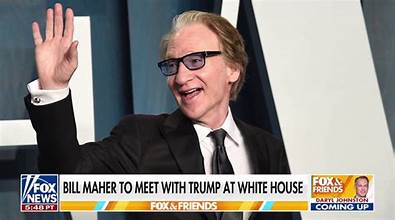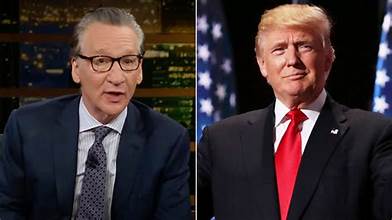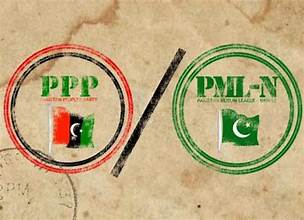American politics has often been described as part governance, part theater. In today’s digital age, much of that theater unfolds on social media platforms, where politicians spar with memes, quips, and sharp commentary. Recently, California Governor Gavin Newsom caught national attention for his online trolling of former President Donald Trump, earning praise from none other than comedian and political commentator Bill Maher. Maher, known for his candid takes on politics, described Newsom’s approach as “very funny,” sparking a broader conversation about the role of humor in political discourse.
The Exchange That Sparked Attention
The incident that caught Maher’s eye involved a series of social media posts by Newsom aimed at Trump’s frequent claims about political victories and grievances. Trump, who often uses platforms like Truth Social to lash out at opponents and assert his dominance, found himself on the receiving end of a witty counter from Newsom. Instead of the traditional political rebuttal, Newsom used humor, sarcasm, and sharp timing to highlight Trump’s contradictions and perceived weaknesses.
Maher, in his commentary, praised Newsom’s trolling not for its political substance but for its comedic value. He acknowledged that humor, when used effectively, can cut through the noise of traditional political debates and resonate more strongly with the public.
Why Maher Found It “Very Funny”
As a comedian, Bill Maher has long argued that humor is an essential tool for both exposing hypocrisy and engaging the public. In this case, he pointed out that Newsom’s posts stood out because they were clever rather than bitter. Humor, Maher suggested, allows politicians to reach people who might otherwise tune out when faced with endless political jargon.
The ability to “troll” without appearing petty is a rare skill, and Maher seemed impressed that Newsom managed to do it effectively. For Maher, who has frequently criticized politicians for lacking wit or authenticity, this was a refreshing change of pace.
The Rise of Social Media Humor in Politics

Social media has fundamentally reshaped how politicians communicate with the public. Where once political speeches, debates, and press conferences dominated, now memes, videos, and quick-witted posts can define public perception. Humor, in particular, travels quickly online. A well-crafted jab can reach millions in a matter of hours, far outpacing traditional press coverage.
Newsom’s trolling of Trump is not the first time humor has been weaponized in politics. Former President Barack Obama was known for his sharp comedic timing, often showcased during White House Correspondents’ Dinners. More recently, politicians such as Alexandria Ocasio-Cortez have leveraged platforms like Twitter to mix humor with serious messaging.
Trump himself has often used humor—albeit in a cutting or mocking form—to belittle opponents. The difference with Newsom’s approach, however, lies in the balance between wit and relatability, which Maher recognized as particularly effective.
Political Humor as a Double-Edged Sword
While humor can make politics more accessible, it also carries risks. A poorly timed joke or an attempt at trolling that misses the mark can backfire, appearing insensitive or unprofessional. Politicians walk a fine line between entertaining their base and alienating those who expect seriousness from elected officials.
In Newsom’s case, Maher’s praise suggests that the governor managed to strike the right tone. By poking fun at Trump without descending into cruelty, he showcased how humor can be used strategically to undermine an opponent while still engaging audiences.
Maher’s Broader Role in Political Commentary
Bill Maher has built his career on blending comedy with political critique. His HBO show Real Time with Bill Maher often features satirical monologues that dissect current events, providing both laughs and insights. However, Maher has also faced criticism for being too harsh or politically incorrect.
His praise of Newsom is notable because Maher does not easily hand out compliments to politicians, regardless of party affiliation. In fact, he has often criticized Democrats for being overly cautious, dull, or lacking in charisma. By highlighting Newsom’s humor, Maher was not just complimenting the governor but also sending a message to the broader Democratic Party: wit and relatability are assets worth cultivating.
Humor as a Political Strategy for Democrats

The Democratic Party has often struggled to counter Trump’s dominance of media narratives. Trump’s unconventional style, brashness, and ability to dominate headlines has left many Democrats scrambling to keep up. Maher’s recognition of Newsom’s trolling suggests that humor could be one way to level the playing field.
By using social media to highlight Trump’s contradictions through comedy rather than anger, Democrats can potentially reach younger, digitally savvy audiences. Humor breaks down barriers and can make political messaging feel less like propaganda and more like entertainment.
Will Newsom’s Humor Help His National Image?
While Newsom has repeatedly denied any immediate ambitions to run for president, his national profile continues to rise. His debates with conservative figures like Florida Governor Ron DeSantis and his growing media presence have made him one of the Democratic Party’s most visible leaders.
If humor becomes a recurring part of his strategy, it could help him build a unique political brand—one that positions him as both serious on governance and relatable in style. Maher’s praise adds a layer of legitimacy, given Maher’s influence among politically engaged audiences who appreciate wit in public discourse.
Conclusion: Politics Meets Comedy in the Digital Era
The intersection of politics and comedy has never been sharper than it is today. Gavin Newsom’s trolling of Donald Trump, and Bill Maher’s praise of it, highlight how humor can serve as both a political weapon and a unifying form of entertainment.
For Maher, calling Newsom’s trolling “very funny” was more than a casual compliment—it was an acknowledgment that humor has become a central part of how leaders connect with people in the digital era. As the political landscape grows more polarized and saturated with rhetoric, the leaders who can wield humor effectively may find themselves with a significant advantage.
In the end, Newsom’s posts remind us that sometimes, the sharpest political commentary doesn’t come from lengthy speeches or policy papers—it comes from a clever joke that says more in a sentence than a campaign could say in a month.



